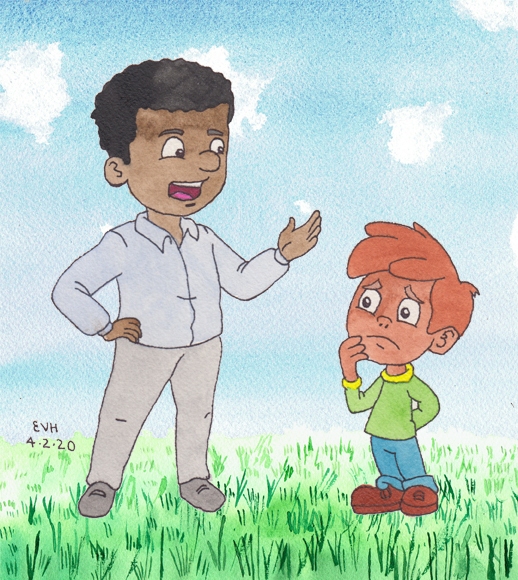
Jataka 238
Ekapada Jātaka
One Foundation
as told by Eric Van Horn
originally translated by William Henry Denham Rouse, Cambridge University
originally edited by Professor Edward Byles Cowell, Cambridge University
This is a lovely little story about a young man who wants to know the path to awakening.
In this story the Bodhisatta teaches that the path to awakening is “skill, virtue, and patience.” “Skill” is an important part of right conduct. It is the difference between “good intentions” which may be harmful and unskillful, and “skillful intentions” which include wisdom and good judgment.
“Tell me one word.” The Master told this story at Jetavana. It is about a certain landowner.
We are told that there was a landowner who lived at Sāvatthi. One day his son was sitting on his hip, and he asked him what is called the “Door” question. (This question refers to the different ways of entering the path.) He replied, “That question requires a Buddha. No one else can answer it.”
So he took his son to Jetavana. He saluted the Master. “Sir,” he said, “as my son sat on my hip, he asked me the question called the ‘Door.’ I didn’t know the answer, so I am here to ask you to give it.”
The Master said, “This is not the first time, layman, that the lad has been a seeker after the way to accomplish his ends, and that he asked wise men this question. He did so before, and wise men in past days gave him the answer. But because of the dimness caused by rebirth, he has forgotten it.” And at his request the Master told this story from the past.
(Notice that the Buddha is not accusing him of being “dim-witted.” He is simply referring to the normal loss of memory that comes in rebirth.)
Once upon a time, when Brahmadatta was reigning in Benares, the Bodhisatta came into this world as a rich merchant’s son. He grew up, and when in the course of time his father died, he took his father’s place as a merchant.
And his son, a young boy sitting on his hip, asked him a question: “Father,” he said, “tell me something in one word that embraces a wide range of meaning.” And he repeated the first stanza:
“Tell me one word that all things comprehends,
By what, in short, can we attain our ends?”
His father replied with the second stanza:
“One thing for all things precious - that is skill,
Add virtue and add patience, and you will
Do good to friends and to your foes do ill.”
(The Bodhisatta is not saying to harm your enemies. He is saying that by doing good you will implicitly harm enemies. An example of this is the saying that “the best revenge is a good life.”)

Figure: Teaching Skill, Virtue, and Patience
Thus did the Bodhisatta answer his son’s question. The son used the way that his father pointed out to accomplish his life purpose, and by and bye he passed away to fare according to his karma.
When this discourse ended, the Master taught the Four Noble Truths at the conclusion of which father and son attained stream-entry. Then the Master identified the birth: “This man was then the son, and I was the merchant of Benares.”
